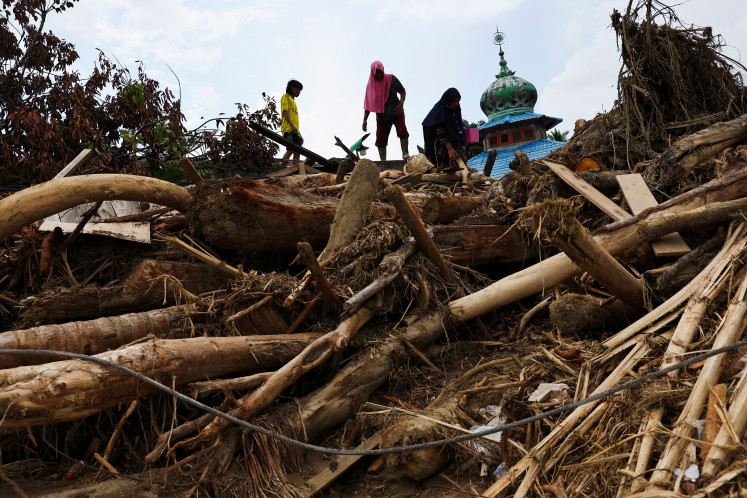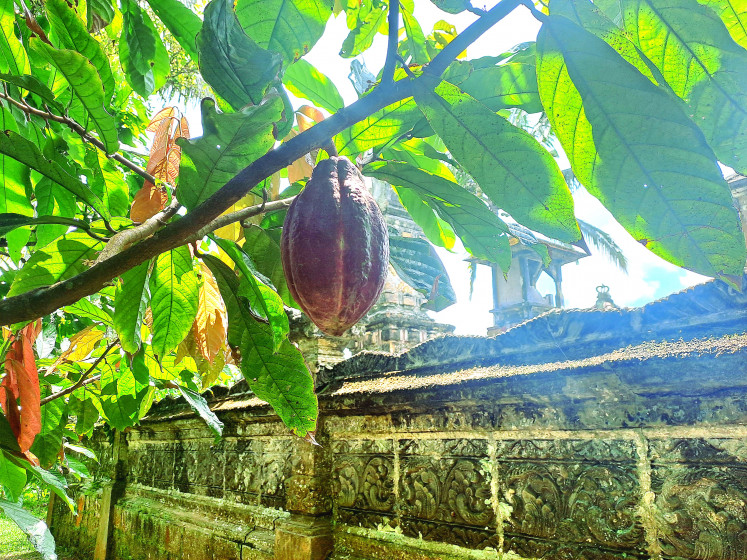Popular Reads
Top Results
Can't find what you're looking for?
View all search resultsPopular Reads
Top Results
Can't find what you're looking for?
View all search resultsPrivate sector to challenge EU biofuel ban
Palm oil producers support the government’s efforts to challenge the European Union’s latest decision to completely phase out the consumption of palm oil, which the EU has classed as a high-risk vegetable oil, by 2030
Change text size
Gift Premium Articles
to Anyone
P
alm oil producers support the government’s efforts to challenge the European Union’s latest decision to completely phase out the consumption of palm oil, which the EU has classed as a high-risk vegetable oil, by 2030.
In addition to filing a separate legal suit, palm oil producers and separate parties would provide funds for the government to oppose the EU’s move.
The European Commission adopted on March 13 the Delegated Regulation Supplementing Directive 2018/2001, dubbed the Delegated Act, on sustainability criteria for biofuel, a derivative of the EU’s Renewable Energy Directive II (RED II).
Under the regulation, palm oil is the only commodity singled out for having a high risk of causing deforestation based on indirect land use change (ILUC) risks, which are calculated on the basis of agricultural land previously destined for food but converted to biofuel production.
A high-ranking Trade Ministry official said in Jakarta on Thursday that local palm oil businesses are preparing to file a lawsuit against the Delegated Act with the European Court of Justice (ECJ), at the same time as the government is selecting a law firm to back its legal suit with the EU at the World Trade Organization (WTO).
“We do not have a certain deadline for bringing the dispute to the WTO because our palm oil trade [to the EU] had not been halted in the past couple of years, so we still have time,” the ministry’s director general for foreign trade, Oke Nurwan, told reporters on Thursday.
“What matters the most right now is not about [potential financial] losses, but rather about overturning the negative impression of palm oil and its products.”
Separately, Indonesian Biofuel Producers Association chairman Paulus Tjakrawan confirmed that the members of his association have been considering filing a lawsuit against the EU with the ECJ. He did not say when that would take place.
“It is true that we are considering suing the EU. We are currently seeking legal advice from law experts,” Paulus told The Jakarta Post via text message on Thursday.
Meanwhile, the chairman of the Indonesian Palm Oil Producers Association, Joko Supriyono, told the Post his association has not considered any similar move, saying that the EU’s Delegated Act was more concerned with biofuel producers.
The Council of Palm Oil Producing Countries (CPOPC) has pointed out that the ILUC approach was a “scientifically flawed concept” that classified, for instance, soybeans as low risk in terms of its ILUC despite the EU’s own in-house research concluding that soybeans were responsible for far more imported deforestation.
In a statement issued in April, the CPOPC questioned whether political and economic protectionism, rather than science-based decisions, were the true drivers of the Delegated Act, which the CPOPC called in its statement “a calculated and adverse economic and political strategy to remove palm oil from the EU marketplace”.
Furthermore, Oke said the government-backed Indonesian Oil Palm Estate Fund was ready to provide funding to
the government throughout the dispute settlement process at the WTO.
“Further aspects on funding will be discussed later on [...] after we have selected a law firm to aid the government,” he added.
The feud between the EU and palm oil producing countries, as well as consistent negative campaigning over the commodity, has dragged down the value of Indonesia’s exports as the world’s largest palm oil exporter.
Statistics Indonesia reported that a drop in global palm oil prices contributed to the country’s historic US$2.5 billion trade deficit recorded in April. While CPO exports actually increased in volume, their value went down by 27.86 percent month-to-month to US$919 million from $1.27 billion in March.










